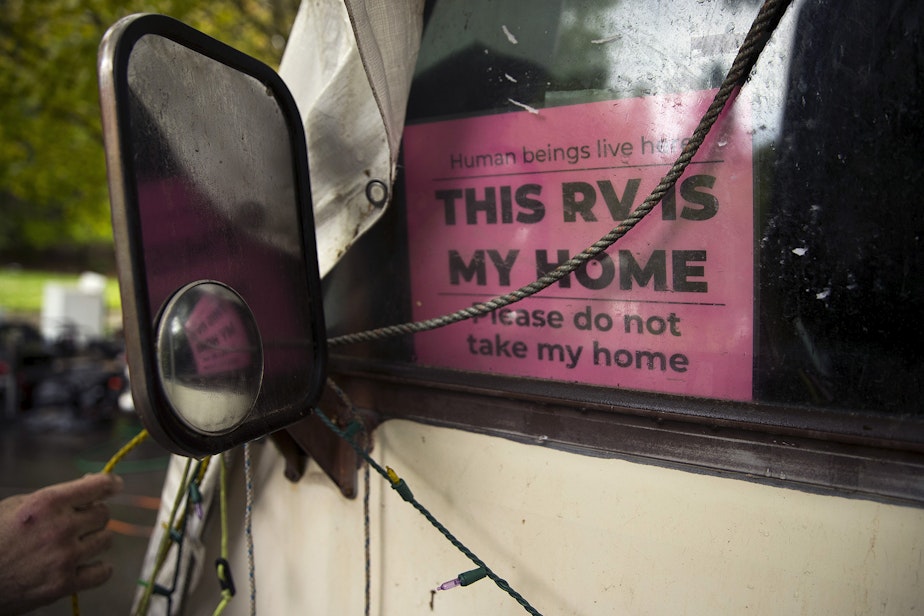Pierce, King counties announce new safe parking lot programs for RVs and other vehicles

Roughly a third of those experiencing homelessness in the region live in their vehicles. Two new pilot programs will test the viability of supervised safe parking lots for people living in their vehicles, with aims to build a long-term solution for homelessness around RVs and other vehicles.
Seattle is a city where, earlier this year, a single parking space sold for $50,000. It's also a place where many people live in their cars.
While vehicles can provide shelter and mobility, consider the barriers: Reliable and safe parking can be hard to find, and parking fines add up.
To help, Seattle previously experimented with something called "safe parking lots," which are designated parking areas for those living in their vehicles. These sites provide essential services like food and showers, as well as other outreach programs. The region's previous programs were short-lived — in 2016 there was a test lot in Ballard, as well as a 2018 lot in SODO, where three people died.
This month, the King County Regional Homelessness Authority and Seattle City Council announced they were awarding the Low Income Housing Institute (LIHI) $1.9 million to develop a new RV safe lot program in Seattle.
LIHI officials are hoping to find a suitable lot before winter sets in.
Sponsored
"There's thousands of people living in their vehicles and living in their RVs across the city," said Josh Castle, director of advocacy and community engagement at the LIHI. "This is initially going to take care of a fraction of that, but we think this is a pilot program. So the idea is to roll this out, get it established, and learn from it, refine the program, and then scaled up to meet the need, and and hopefully open more of these safe RV sites."
In Pierce County, a pilot program was passed in late May to coordinate safe-lot services with religious and city organizations. A handful of churches are volunteering their parking lots to house vehicles and provide services like housing outreach, food, and showers.
In contrast with Seattle's incoming safe-lot infrastructure, Pierce County's program does not primarily focus on RVs, and local lots support a range of specific clients.
"The program can be maintained in such a way where you can determine how many folks you can effectively serve on your property," said Samara Jenkins, the pastor at Spanaway United Methodist Church, which has been operating a safe lot since October. They primarily serve families from within the local school district, single women, and veterans.
"You can set up your guidelines," Jenkins said. "Background checks are mandatory. And so there's just so much good that can come from offering this."
Sponsored
Castle and Pierce County Councilmember Ryan Mello, who co-sponsored Pierce County's safe-lot bill, said they are hopeful their respective programs will provide a pathway forward to address insufficient and transitional housing problems in the region.
"I think the the markers for success are going to be the number of hosts that we have signed up to volunteer to host safe parking, how many stalls that are available at any given night throughout Pierce County," Mello said. "Are we meeting the demand? Are people utilizing that option? And how was the harmony between the neighboring community and the host? We really envision them being low impact."
The LIHI's safe-lot program will operate for six months once it's established, and is also seeking $5 million in additional funding to expand to other locations. Pierce County's pilot will also be revisited in six months to explore additional funding and options.





